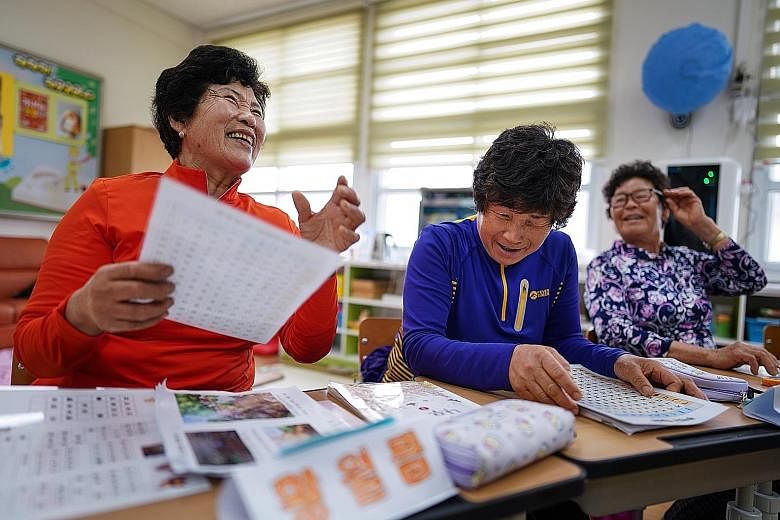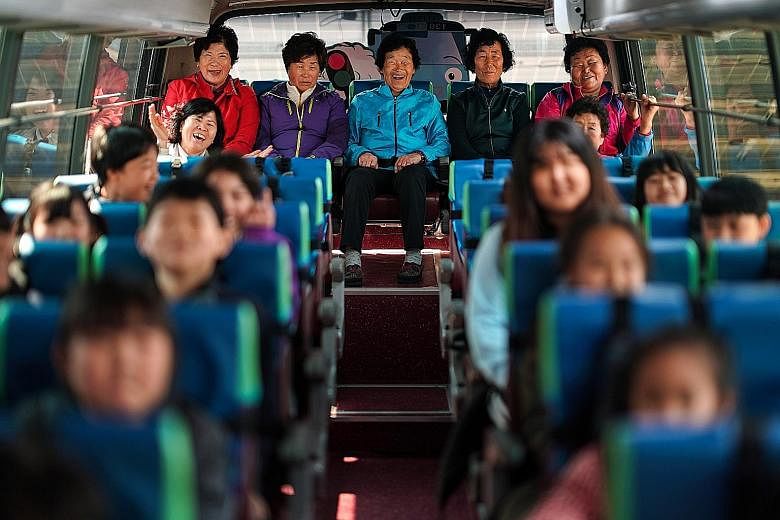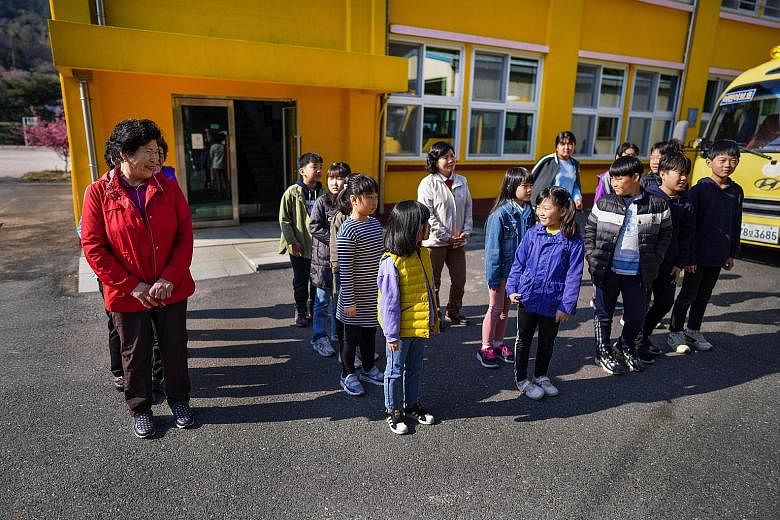GANGJIN COUNTY (South Korea) • Every morning on her way to school, first-grader Hwang Wol-geum rides the same yellow bus as three of her family members: One is in kindergarten, another a third grader, and the other a fifth grader.
However, Madam Hwang is 70 - and her schoolmates are her grandchildren.
Illiterate all her life, she remembers hiding behind a tree and weeping as she saw her friends trot off to school six decades ago.
While other village children learnt to read and write, she stayed home, tending pigs, collecting firewood and looking after her younger siblings. She later raised six children of her own and sent all of them to high school or college.
Yet, it always pained her that she could not do what other mothers did. "Writing letters to my children, that's what I dreamed of the most," Madam Hwang said.
Help came unexpectedly this year from the local school that was running out of school-age children and was desperate to fill its classrooms with pupils.
South Korea's birthrate has been plummeting in recent decades, falling to fewer than one child per woman last year, one of the lowest rates in the world.
The hardest-hit areas are rural counties, where babies have become an increasingly rare sight as young couples migrate en masse to big cities for better paying jobs.
Like other rural schools, Daegu Elementary in Madam Hwang's district has seen its pupils dwindle. When Madam Hwang's youngest son, Mr Chae Kyong-deok, 42, attended the school in the 1980s, it had 90 pupils in each grade.
Now, the school has only 22 pupils in total, including one each in its fourth-and fifth-grade classes.
This year, the worst calamity of all struck the district.
"We went around villages looking for just one precious kid to enrol as a first grader," said the principal, Mr Lee Ju-young. "There was none."
So Mr Lee and local residents, desperate to save the 96-year-old school, came up with an idea: How about enrolling older villagers who want to learn to read and write?
Madam Hwang and seven other women, aged 56 to 80, stepped forward, with at least four others asking to be enrolled next year.
The local education office warmed to the idea and Madam Hwang started attending classes last month.
Like many first graders on their first day, Madam Hwang cried. But these were tears of joy. "I couldn't believe this was actually happening to me," she said. "Carrying a school bag has always been my dream."
Once overcrowded with pupils, the seaside campus of Daegu Elementary looked almost empty on a recent visit.
Inside the two-storey school building, children and grandmothers walked along hallways decorated with locally produced jade-green celadon vases.
In the first-grade classroom, Madam Hwang and two other grandmothers toiled laboriously, determined to learn to read and write.
Pencil in hand, they chanted the 14 consonants and 10 vowels of the Korean alphabet as their teacher, Ms Jo Yoon-jeong, 24, wrote them on the white board. They took dictation on words such as "aunt", "fisherman" and "raccoon" with their slow and crooked penmanship.
Between writing exercises, Ms Jo turned on an upbeat song and led a dance routine for the giggling grandmothers to follow.
"School is so much fun," Madam Hwang said.
Madam Hwang's county, Gangjin, on the south-western tip of South Korea's coast, is typical of the rural areas left behind in South Korea's rapid industrialisation.
Gangjin's last major industry, pottery making, died when plastic began replacing crockery in Korean kitchens in the 1970s. Its rapidly ageing population now makes a living growing strawberries and mulberries, or picking oysters, cockles and octopuses from tidal flats.
Decades ago, Korean families often focused what little resources they had on educating their sons. Many girls were expected to stay home and look after younger siblings while their parents worked.
Being illiterate brought many humiliations later in life. Posting packages was a problem because Madam Hwang could not write addresses.
Years ago, she and her husband, Mr Chae Jan-ho, 72, were visiting their son in Seoul when they got separated in the bustling subway. She could not read the signs and was hopelessly lost until a stranger helped her find her way.
Now, she and her fellow classmates are determined to make up for lost time. "They are eager to learn," said Ms Jo about her first-grade pupils. "They are probably the only pupils here asking for more homework."
And Madam Hwang has already hatched an ambitious plan.
"I am going to run for president of the village women's society," she said. "People used to ask me to run, but I always declined. It's a job for someone who can read and write."
NYTIMES



